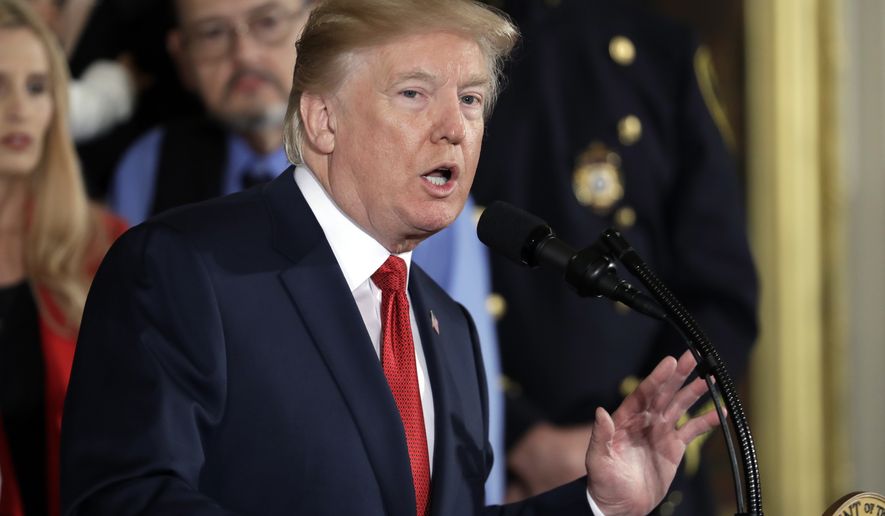The Justice Department will turn over documents related to the anti-Trump opposition research dossier by next week, House Speaker Paul D. Ryan said Thursday, giving congressional investigators access to information they’ve long been seeking about the genesis and use of the controversial document.
Mr. Ryan, meanwhile, expressed frustration that leaked details about the origin of the dossier have appeared in media reports over recent days, despite months of attempts by the House Intelligence Committee to obtain information about the document from government investigators.
The moves follow revelations this week that research behind the dossier, which reportedly had initially been funded by an unknown Republican client during the GOP primary, was paid for subsequently by the Democratic National Committee and Hillary Clinton’s presidential campaign.
“The FBI got in touch with us yesterday afternoon, and they have informed us that they will comply with our document requests, and that they will provide the documents Congress has been asking for,” Mr. Ryan, Wisconsin Republican, said at his weekly news conference. “We expect the FBI to honor that commitment.”
Both the FBI and Justice Department declined to comment Thursday.
The revelations of DNC and Clinton involvement have added fresh fuel to political controversy surrounding the 35-page dossier, which first surfaced during the final weeks of last year’s presidential campaign with salacious and unsubstantiated claims about Mr. Trump’s alleged activities in Russia and relationships with Russian officials.
The House Intelligence Committee sent a pair of subpoenas to the Justice Department and FBI in August seeking information about the agencies’ relationship with former British spy Christopher Steele, who was paid by the opposition research firm Fusion GPS to compile the dossier on Mr. Trump.
The committee also sought any copies of Foreign Intelligence Surveillance Act applications that relied upon information provided by Mr. Steele.
As the weeks passed without any response, House Intelligence Committee Chairman Devin Nunes threatened to drag both Attorney General Jeff Sessions and FBI Director Christopher A. Wray before the committee to explain why the subpoenaed documents had not been provided.
Justice Department officials later said they had asked the committee to put the compliance dates for the subpoenas on hold while negotiations over the dossier’s production were ongoing. Deputy Attorney General Rod Rosenstein also met with Mr. Nunes at the Capitol on Sept. 28 to discuss the matter.
With that as a backdrop, Fusion GPS filed a complaint in federal court for the District of Columbia last Friday seeking to prevent its bank from turning over financial records that had also been subpoenaed by the House committee.
U.S. District Judge Tanya Chutkan has expressed apprehension about issuing a ruling in the case and encouraged the House and Fusion to negotiate an agreement.
“I really am very reluctant to get any further involved than I need to, because this concerns Congress’ clear right to investigate matters that they believe deserve investigation, and I don’t want to insert the judicial branch into this any more than it needs to,” the judge said during a conference with the parties.
With the parties still negotiating Thursday, she postponed the subpoena deadline from Friday until 9 a.m. Monday.
On a separate front, this week’s revelations have breathed new life into a months-old witch hunt among former GOP presidential candidates over whom among them may have first paid for the opposition research behind the document.
Thursday saw Sen. Marco Rubio — Mr. Trump’s fiercest rival during primary — categorically deny he had anything to do with it. “As far as whether it was my campaign, it wasn’t and I’ll tell you why,” Mr. Rubio told CNN. “I was running for president. I was trying to win. If I had anything against Donald Trump that was relevant and credible and politically damaging, I would have used it. I didn’t have it.”
Democrats are seen to be fanning the flames of reports that the dossier had its origins in the GOP primary. Former Clinton spokesman Brian Fallon tweeted Tuesday night that Republicans “pouncing” on the revelations of subsequent DNC and Clinton campaign financing of the document “are surely in for a self-own when we learn who funded the project during the GOP primary.”
Others have sought to put the focus on Mrs. Clinton and the DNC. Wednesday saw a group known as the Campaign Legal Center file a campaign finance complaint asserting that the Clinton campaign appeared to have used a law firm to deliberately disguise payments for the research that went into the dossier.
Some on Capitol Hill say the bigger issue involves questions about how information in the dossier may have become a driving factor behind an FBI probe last year into alleged Trump-Russia ties. “Now that we know who funded it, it’s important to know how information from the Steele dossier was used by law enforcement,” Jack Langer, a spokesman for Mr. Nunes said Thursday.
⦁ Stephen Dinan and Guy Taylor contributed to this report.
• Andrea Noble can be reached at anoble@washingtontimes.com.




Please read our comment policy before commenting.